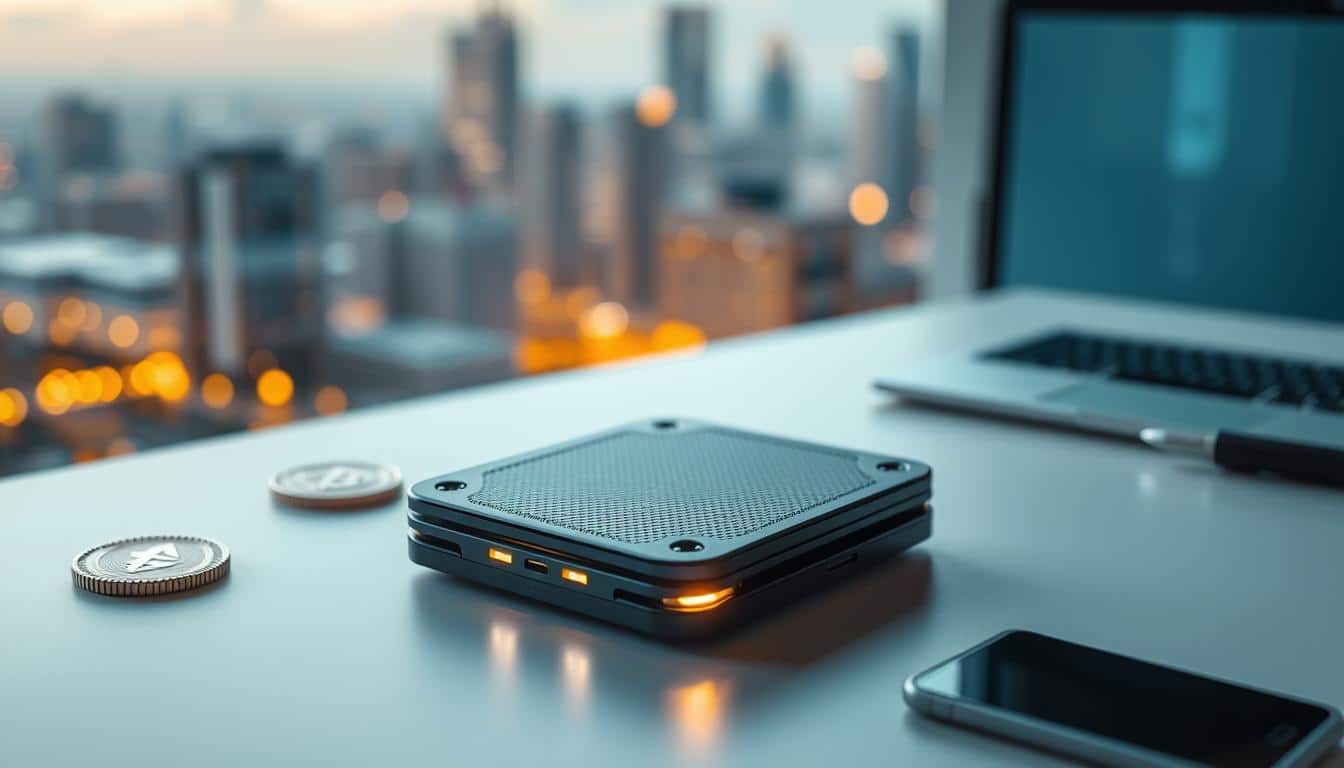Did you know that around 5 million hardware wallet units have been sold? This is in a market with about 250 million crypto holders1. Hardware wallets offer top-notch security. They have specific firmware that blocks unauthorized access to private keys2. If you’re exploring the cryptocurrency world, you’ve probably seen these wallets. With so many choices, it’s hard to tell if they’re really worth the excitement.
Wallets like the Ledger Nano X and Trezor Model T keep your private keys offline. This is key for protecting your digital assets from complex viruses and online threats2. If you own a lot of cryptocurrency, protecting your investment is critical. These devices give you a real safety edge by keeping cyber-attacks at bay.
Key Takeaways
- Hardware wallets are highly recommended by experts for their enhanced security features1.
- Around 5 million hardware wallet units have been sold globally1.
- These wallets protect against physical attacks and reduce your exposure to online threats2.
- The Ledger Nano X supports over 1,300 cryptocurrencies2.
- Mass adoption of hardware wallets has been hindered by design-related issues and user experience1.
Introduction to Hardware Wallets
People who are really into crypto put a lot of emphasis on Crypto Wallet Protection. A top solution for this is using hardware wallets. These gadgets keep your private keys safe offline and are super secure. They’re perfect for those who really focus on safety or have a lot of digital money3.
What Are Hardware Wallets?
Think of hardware wallets like USB sticks that keep your crypto keys safe from online dangers. Brands like Ledger and Trezor make these with top-notch security to protect your funds34. While the wallets themselves don’t have fees, doing transactions can have some costs3.
Why Use a Hardware Wallet?
Using hardware wallets is key for keeping large amounts of crypto secure. Their offline design makes them super safe3. Here’s why they’re great:
- They’re really secure, with no cases of stolen Bitcoins from these devices4.
- If your wallet gets lost, you can get your crypto back with a seed phrase3.
- Big names like Ledger and Trezor are behind these wallets, offering strong security3.
With prices from $30 to $200, spending on the Best Hardware Wallets is smart for serious Crypto Wallet Protection3.
The Importance of Security in Cryptocurrency
In today’s growing digital world, keeping cryptocurrencies safe is key. More people are using cryptocurrencies every day. This makes protecting your digital money very important. One crucial way to do this is by ensuring your crypto wallet is secure.
Protecting Your Digital Assets
Today, 562 million people own digital assets, which is a big jump from before. This shows how important it is to keep digital currencies safe5. In the US, 40% of adults have cryptocurrency5. Using hardware wallets helps a lot. They store your crypto keys offline, keeping them safe from online dangers.
These wallets create and keep your private keys, which are long codes, safe offline6. Without one, your keys are online, which could lead to them being stolen.
Types of Wallet Security
Crypto holders split their wallets into hot and cold types. Hardware wallets are a kind of cold wallet. They keep your keys off the internet, which helps avoid hackers6. Although they offer great security, only 2% of crypto users have one5. But, their use is predicted to grow by 22.3% until 20305.
The Pros of Using Hardware Wallets
Hardware wallets are a top pick for many who hold cryptocurrencies. They let you keep your private keys offline. This greatly lowers the chance of being hacked. Keeping your Secure Digital Assets safe7. Brands like Ledger and Trezor are trusted for keeping private keys safe7.
Enhanced Security
Hardware wallets offer strong protection. They keep private keys offline, away from online dangers like malware or phishing8. They use PINs and recovery phrases for more security. This makes it hard for others to get in7. They also let you safely earn through crypto staking7.
User-Friendliness
Many hardware wallets have easy interfaces. They’re good for those new to crypto. This makes them a good choice before moving to safer options7. Reviews say setting up these devices is simple, appealing to many.
Compatibility with Multiple Cryptocurrencies
Hardware wallets work with many cryptocurrencies. The Ledger Nano X supports over 5,500 types, including Bitcoin and Ethereum7. This makes managing your portfolio easier.
Backup and Recovery Options
These wallets also have strong backup and recovery features. If you lose your device, you can get your money back using recovery phrases. You keep full control over your assets. This is a key benefit of hardware wallets8.
| Feature | Benefits |
|---|---|
| Enhanced Security | Offline storage of private keys, use of PIN codes, and recovery phrases |
| User-Friendliness | Easy setup and management interfaces |
| Compatibility | Support for thousands of cryptocurrencies |
| Backup and Recovery | Secure recovery phrases for lost or stolen devices |
The Cons of Using Hardware Wallets
Hardware wallets are famous for their security, but they have drawbacks too. One main issue is their cost. Hardware wallets can be pricier than software ones, ranging from $50 to a few hundred dollars9. This might put off some users, especially those just starting out.
Another big concern is the risk of physical damage. Since hardware wallets are physical items, they can get damaged by the environment or if dropped9. If you lose or damage the device without backing it up, you might not get to your digital money. Even with strong security, the chance of physical harm is something you can’t ignore.
Hardware wallets are also less handy compared to software wallets. To use them, you must have the device with you, which can be a hassle10. This extra step might make them inconvenient for people who need to access their funds quickly and easily.
Getting to your digital assets can be tough for some people. Those who don’t have steady internet or aren’t tech-savvy may struggle with hardware wallets. Setting up and using these wallets can be hard, especially for those not good with technology9. In a Crypto Wallet Comparison, hardware wallets might seem hard to use for these individuals.
Even with these downsides, it’s key to think about what you need when looking at a Crypto Wallet Comparison. It’s vital to balance the safety benefits against the possible negatives. This helps you make a choice that fits with your investing approach and how comfortable you are with tech.
Comparing Hardware Wallets to Other Wallet Options
If you’re looking to keep your cryptocurrencies safe, comparing crypto wallets is key. Hardware wallets and software wallets have big differences. Knowing these can help you make smart choices about how to protect your digital money.
Hardware Wallets vs. Software Wallets
Hardware wallets give top-notch security by keeping private keys offline. This lowers the chance of online hacking importance of hardware wallets11. On the other hand, software wallets are online and face more risks like hacking and malware11. Software wallets are free and good for daily use and small crypto amounts. But hardware wallets, though they cost, are best for storing crypto for a long time safely11. Plus, hardware wallets now have cool features like fingerprint checks for extra security11.
Hot Wallets vs. Cold Wallets
The discussion on hot wallets versus cold wallets is about finding the right mix of ease and safety. Hot wallets are easy to use for quick transactions but are riskier because they’re always online. In contrast, cold wallets, especially the top hardware wallets, are offline which adds a security layer against online dangers1112. These wallets pass strict security checks and use certified safe parts, making them ideal for storing a lot of crypto safely12. With extras like multisig and different backup choices, hardware wallets offer strong protection for your digital money12.
These points underline the importance of picking the right wallet for your needs, for everyday use or for secure long-term storage. As tech progresses, wallet tech will aim to blend high security with ease of use.
How Hardware Wallets Work
Hardware wallets, like Ledger Nano and Trezor Model T, keep private keys safe13. They do this away from online risks1314. With Crypto Wallet Protection in mind, these wallets don’t rely on your computer. This means your private keys stay hidden when you make transactions13.
To use them, you must connect your hardware wallet to a computer13. Yet, the actual signing of transactions happens inside the device13. This setup blocks hackers and viruses, making your Secure Digital Assets safe1514. Hardware wallets have top-notch security and can help you recover your assets if needed14.
While superb at security, hardware wallets are not great for quick transactions15. They do support many cryptocurrencies and NFTs, which is a plus14. By keeping your keys offline, they provide excellent Crypto Wallet Protection and Secure Digital Assets care1315.
Hardware Wallet Reviews: Which Ones Stand Out?
When looking for the best hardware wallets, think about security, how easy they are to use, and the coins they support. Here’s a look at top picks like the Ledger Nano X, Trezor Model T, and KeepKey.
Ledger Nano X
The Ledger Nano X is a favorite for many. It costs $149 and supports over 5,500 coins and tokens. This makes it one of the most flexible wallets out there16. Ledger is known for being safe. More people want it after the FTX and Celsius issues showed how important a good crypto wallet is17.
It comes with Bluetooth and a long-lasting battery. This makes it easy to use, even when you’re moving around.
Trezor Model T
The Trezor Model T is also $149. People like its colorful touchscreen which makes it simple to use16. Trezor focuses on safety. This has drawn in users, especially after problems at places like Mt. Gox and BitGrail17. It supports many cryptocurrencies, offering a secure and friendly way to keep your digital money safe.
KeepKey
KeepKey stands out for being easy to use, perfect for beginners. It’s cheaper, at $85, but still keeps your crypto safe16. It keeps private keys offline, safe from online threats17. Its simple design and easy interface make it popular with those who want a no-fuss way to store their crypto.
Comparison Table
| Feature | Ledger Nano X | Trezor Model T | KeepKey |
|---|---|---|---|
| Cost | $14916 | $14916 | $8516 |
| Supported Coins | 5,500+16 | 1,000+ (Approx.)17 | 50+16 |
| Key Feature | Bluetooth Connectivity | Full-Color Touchscreen | Simplicity and Ease of Use |
Choosing the right hardware wallet depends on what you need and like. You might want lots of coin options, a cool touchscreen, or something simple if you’re new. Looking at features and prices helps you decide wisely.
Hardware Wallets: Are They Really Worth the Hype?
Exploring the world of cryptocurrency means figuring out how to keep your digital cash safe. One top choice is using hardware wallets for top-notch Cryptocurrency Security13. These gadgets, from brands like Ledger and BC Vault, store your private keys offline. They also offer extra safety like two-factor authentication and multi-signature support13.
Even though buying a hardware wallet might cost between $50 to several hundred dollars upfront, the security they provide is worth it9. It’s especially important for those who own a lot of cryptocurrency to keep their assets safe. Hardware wallets do this by keeping the private keys offline, away from harmful software13.
Handling multiple cryptocurrencies is easier with hardware wallets since they can manage various blockchains all at once6. They are designed to be user-friendly, so even if you’re not a tech guru, you can securely store and manage your crypto9. Plus, there’s the exciting collaboration between Crypto.com and CoolBitX, resulting in the Crypto.com x CoolWallet Pro. This device offers up to 2% in CRO as Pay Rewards13.
Hardware wallets aren’t for everyone, primarily if you trade daily, because they need to be physically connected13. But they’re excellent for long-term security, with features like backup and recovery in case you lose your device or it gets stolen9. You’ll also set up a PIN to keep your assets extra secure13.
Maintaining good crypto hygiene with hardware wallets is key. Follow best practices like keeping your wallet safely stored, protecting your recovery codes, and doing test transfers6. Only buy from trusted brands and steer clear of second-hand devices to decrease malware risks6. With these precautions, the chance of hardware wallets getting hacked is minimal, making them a preferred choice9.
Conclusion
Understanding the role of hardware wallets in cybersecurity is crucial. These tools ensure top-notch safety by keeping private keys out of online reach. This drastically lowers the risk of cyber threats like malware and hackers18. Big names in the industry, such as Binance Labs, back SafePal and similar hardware wallets. They provide secure, air-gapped connections, placing them among the most reliable methods to safeguard digital money19.
Though hardware wallets may cost more than online options18, their benefits make them worth the expense for many. They support numerous cryptocurrencies, allowing you to manage different assets easily18. Setting them up requires some tech knowledge, and they’re not as handy as software wallets18. You also need to have the wallet on you for transactions.
To sum it up, a hardware wallet is vital if keeping digital assets safe matters to you. By understanding their strengths and weaknesses, you can better shield your digital wealth from threats. For more info on finding the right hardware wallet, including user opinions, visit this in-depth guide.









